U.S. TRAVEL ASSOCIATION
Introduction
The word travel connotes going to faroff places. But travel affects the lives of Americans every day, right in their own backyard.
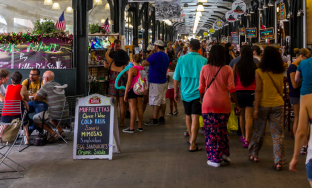 Though sometimes unseen by the communities it serves, travel helps create a sense of place and is inextricably linked to economic development. As a job creator, tax revenue generator and destination storyteller, travel has ripple effects that touch the lives of millions of Americans.
Though sometimes unseen by the communities it serves, travel helps create a sense of place and is inextricably linked to economic development. As a job creator, tax revenue generator and destination storyteller, travel has ripple effects that touch the lives of millions of Americans.
The destination marketers charged with promoting travel—tourism offices, convention and visitors bureaus and destination marketing organizations—have an essential role in the development and growth of their communities.
When businesses make decisions about where to establish or relocate, quality of life is one of the most significant influencers. Is there a good restaurant scene? Are there cultural experiences in the area? How walkable is the city? It is the destination marketer who is best positioned to tell the story and illustrate the value proposition of a place.
Another key factor is the ability to attract and retain talent. Is the city a place that top talent wants to work and live? Travel is the first impression for talent. No matter how strong a company’s reputation, very few prospective candidates relocate for a new job without visiting and experiencing a place firsthand.
The more support and investment in travel promotion a destination marketer has, the stronger the financial returns. Travel-related tax revenues are pure profit, generated by visitors who do not require essential public services of a destination. Without the tax revenue from travel, community residents would be required to shoulder a higher tax burden to pay for police and firefighters, teachers, infrastructure and more.
Investing in travel promotion is investing in economic development. A strong destination brand does more than build awareness; it engenders affinity that can lead to more visitors, and by attracting businesses and talent, it helps create a thriving community. Cutting a destination’s tourism marketing budget—in whole or in part—is a short-sighted decision that undermines a city or state’s viability in ways that takes years, if not decades, to overcome.
The most successful places in America bring all stakeholders to the table. Local and state legislators, economic development organizations, and destination marketers all play a critical role in elevating the community. When done right, it leads to a positive and lasting change that is meaningful to residents and visitors alike.
The Travel Industry Drives Economic Growth and Jobs in America
The travel industry is a primary driver of economic growth and job creation in the United States. Effective travel promotion leads to increased economic activity, well-paying jobs and crucial tax revenue supporting essential public services.
In 2017, the travel industry generated $2.4 trillion for the U.S. economy, supporting 15.6 million American jobs. One in nine U.S. jobs directly and indirectly rely on the travel industry.
Travel’s Downstream Impact
Travelers generate gains for the entire U.S. economy. Aside from the spending on goods and services during trips, the business and materials necessary to produce these goods and services can be considered an indirect travel output. For example, the fruits and vegetables purchased by restaurants or linens used by hotels all have a positive economic impact for industries outside of travel.
Additionally, spending in local areas by the employees of travel businesses and their suppliers generates sales: induced output. For example, the gasoline purchased by employees to get to their jobs is considered an induced output.
Travel: An Indispensable Source of American Jobs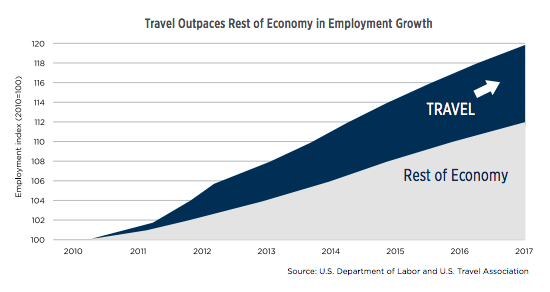
As a labor-intensive industry, the power of travel to create jobs is much greater than other industries. On average, every $1 million in travel goods and services sales directly supports eight jobs. In contrast, on average, every $1 million in sales in other industries directly supports five jobs.
While certainly not immune to the negative effects of recession or other economic downturns, the travel industry is resilient, bouncing back before other industries and generally creating jobs faster than other sectors of the economy. From 2010-2017, the travel industry added 1.5 million jobs—an increase of 20 percent, significantly outpacing the 12 percent employment increase in the rest of the economy. Nine percent of all new jobs created during this period were in the travel industry.
Travel Impacts Communities Across America
States, destinations and communities across the country rely on travel—and traveler spending—for economic development, job creation and tax revenues. The travel industry is a significant economic driver in every congressional district across the country. Within 344 out of 435 congressional districts (79%), the travel industry was among the top seven largest employers among all private industries in 2016.
Travel spending generated $165 billion in total tax revenue, including $76 billion in state and local tax revenue, in 2017. Without these revenues, each U.S. household would pay $1,300 more in taxes every year. This is pure profit for a local economy.
Download full version (PDF): Made in America
About the U.S. Travel Association:
https://www.ustravel.org/
The U.S. Travel Association is the national, non-profit organization representing all components of the travel industry that generates $2.4 trillion in economic output and supports 15.6 million American jobs. U.S. Travel operates as a 501(c)(6) organization. U.S. Travel’s efforts are focused on achieving its vision for the industry: Travel is understood as essential to the economy, American jobs, security, image and well-being of the United States and travelers.
Tags: Economy, Jobs, tourism, Travel, U.S. Travel, U.S. Travel Association





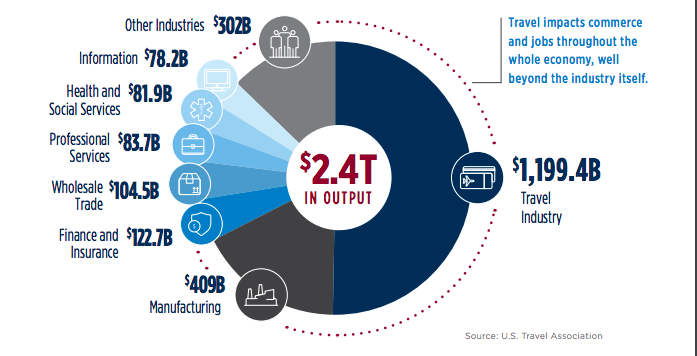
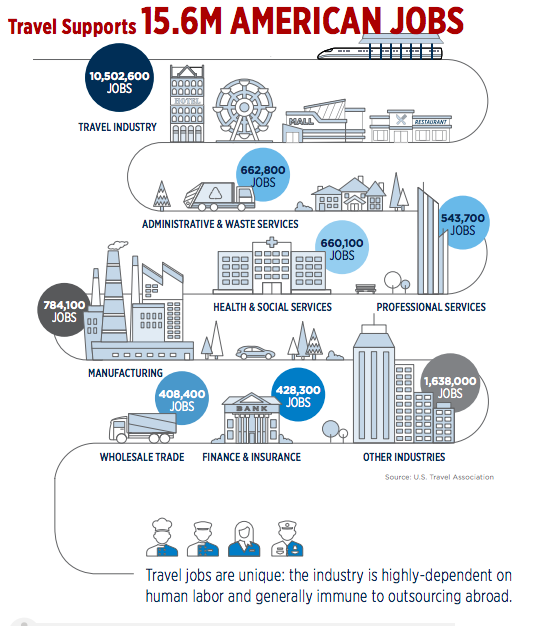
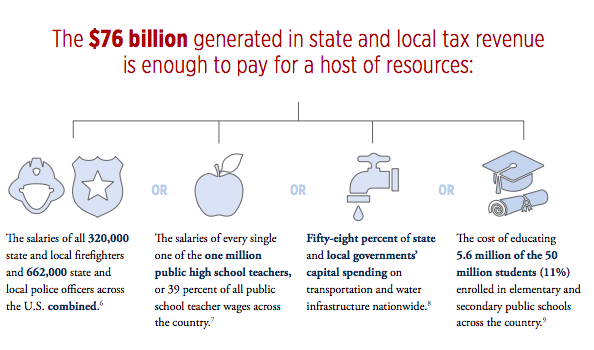

 RSS Feed
RSS Feed